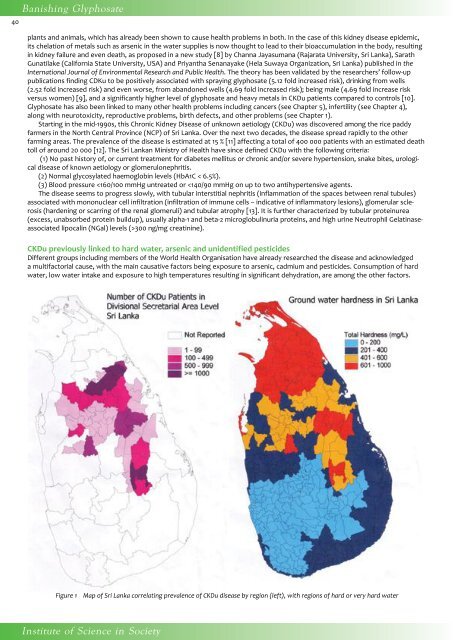Banishing Glyphosate
BanishingGlyphosate
BanishingGlyphosate
Create successful ePaper yourself
Turn your PDF publications into a flip-book with our unique Google optimized e-Paper software.
40<br />
<strong>Banishing</strong> <strong>Glyphosate</strong><br />
plants and animals, which has already been shown to cause health problems in both. In the case of this kidney disease epidemic,<br />
its chelation of metals such as arsenic in the water supplies is now thought to lead to their bioaccumulation in the body, resulting<br />
in kidney failure and even death, as proposed in a new study [8] by Channa Jayasumana (Rajarata University, Sri Lanka), Sarath<br />
Gunatilake (California State University, USA) and Priyantha Senanayake (Hela Suwaya Organization, Sri Lanka) published in the<br />
International Journal of Environmental Research and Public Health. The theory has been validated by the researchers’ follow-up<br />
publications finding CDKu to be positively associated with spraying glyphosate (5.12 fold increased risk), drinking from wells<br />
(2.52 fold increased risk) and even worse, from abandoned wells (4.69 fold increased risk); being male (4.69 fold increase risk<br />
versus women) [9], and a significantly higher level of glyphosate and heavy metals in CKDu patients compared to controls [10].<br />
<strong>Glyphosate</strong> has also been linked to many other health problems including cancers (see Chapter 5), infertility (see Chapter 4),<br />
along with neurotoxicity, reproductive problems, birth defects, and other problems (see Chapter 1).<br />
Starting in the mid-1990s, this Chronic Kidney Disease of unknown aetiology (CKDu) was discovered among the rice paddy<br />
farmers in the North Central Province (NCP) of Sri Lanka. Over the next two decades, the disease spread rapidly to the other<br />
farming areas. The prevalence of the disease is estimated at 15 % [11] affecting a total of 400 000 patients with an estimated death<br />
toll of around 20 000 [12]. The Sri Lankan Ministry of Health have since defined CKDu with the following criteria:<br />
(1) No past history of, or current treatment for diabetes mellitus or chronic and/or severe hypertension, snake bites, urological<br />
disease of known aetiology or glomerulonephritis.<br />
(2) Normal glycosylated haemoglobin levels (HbA1C < 6.5%).<br />
(3) Blood pressure


